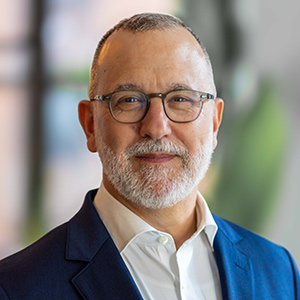Guests
-

President and CEO, BSR
Aron is recognized globally as a preeminent authority on just and sustainable business. In addition to leading BSR, which has grown substantially throughout his tenure as President and CEO, Aron advises senior executives at BSR’s 300+ member companies and other global businesses and partners on the full spectrum of environmental, social, and governance issues.
Aron joined BSR in 1995 as the founding director of its Business and Human Rights program. He later opened BSR's Paris office in 2002, where he worked until becoming President and CEO in 2004. Aron has served on advisory boards to CEOs at AXA, Barrick Gold, Marks & Spencer, Nike, Recruit Holdings, SAP, Shell, and he serves as a director of the We Mean Business Coalition and RISE.
Aron speaks frequently at leading business and public fora and is widely quoted in top-tier media, such as the Financial Times, Le Figaro (France), The New York Times, The Wall Street Journal, Axios, and Politico. He is co-author of the book Sustainable Excellence: The Future of Business in a Fast-Changing World, which spotlights innovative sustainability strategies that enable business success.
Prior to joining BSR, Aron practiced law in San Francisco and worked as a journalist at ABC News in New York. He holds a BA from Tufts University and a JD from the University of California, Berkeley.
Recent Insights From Aron Cramer
- Beyond the Business Case Debate: Reasserting the Strategic Value of Sustainability / July 30, 2025 / Insights+
- A Renewed Approach to Sustainability: Five Building Blocks for Business / July 2, 2025 / Blog
- A Message from Aron Cramer, BSR President and CEO / April 30, 2025 / Blog
- Meeting the Moment Together: BSR’s Partnership with You / April 10, 2025 / Blog
- Navigating Uncertainty: The Impact of U.S. Tariffs on Sustainable Business / April 8, 2025 / Blog
-

Managing Director, Marketing and Communications, BSR
David leads BSR’s marketing and communications initiatives, working with a global team to amplify the organization’s mission and showcase its activities, impacts, and thought leadership to members, partners, and the wider business and policy community.
David previously worked for The B Team, a group of global business and civil society leaders working to catalyze a better way of doing business for the well-being of people and the planet. Throughout his 20-year career, he has worked with businesses and nonprofits in economic development, public health, and sustainability to define and communicate their purpose and impacts. .
He has built high-impact communications campaigns for a collaboration to improve maternal health in Zambia and Uganda, driven top-tier media coverage for a major economic development project in upstate New York, and helped strengthen parliamentary capacity and voter education efforts in South Africa and Zambia. He began his career as a newspaper reporter.
David earned his M.A. from The Elliott School of International Affairs at the George Washington University and his B.A. in Journalism and Political Science from Michigan State University.
Recent Insights From David Stearns
- A Year of Uncertainty: Maintaining Progress Amidst a Battle of Ideas / February 13, 2025 / Audio
- A Conversation with Mario Abreu, Group VP, Sustainability, Ferrero / February 6, 2025 / Audio
- A Conversation with Darsh Myronidis, Group Director of Sustainability, Virgin / January 8, 2025 / Audio
- Reflections from Climate Week NYC: The Tension Between Pragmatism and Ambition / October 1, 2024 / Audio
- Navigating U.S. Election Uncertainty: A Call to Action for Sustainable Business / August 1, 2024 / Audio
Description
Immediately following Climate Week NYC, BSR President and CEO Aron Cramer chats with David Stearns about some of the inconvenient truths facing sustainability leaders going into this annual gathering, observations that gave him cause for optimism, and a look inside some of BSR’s events, including a debate over whether American political leadership is needed for advancing global climate action and shaping climate policies. Aron also highlights two new BSR publications featuring guidance for sustainability leaders on navigating these turbulent times, and new insights from over 30 Chief Sustainability Officers of BSR member companies.
Listen
Transcription
David Stearns:
Welcome to BSR Insights, a series of conversations on emerging and cross-cutting business, economic and social issues. Drawing on BSR's expertise from more than three decades of leadership in sustainable business, we'll help practitioners and decision-makers to navigate today's increasingly complex world. I'm your host, David Stearns.
We're coming off a very busy week of events here in New York City as we've just wrapped up Climate Week in New York City, and I'm pleased to have the opportunity to sit down this morning with Aron Cramer, President and CEO of BSR and to hear some of Aron's reflections from this past week. So welcome, Aron.
Aron Cramer:
Thanks, David.
David Stearns:
Hope you've had a great time in New York.
Aron Cramer:
Yes, it's been fantastic.
David Stearns:
So before we dive in to the main topic, I want to take a moment quickly to chat about a piece that you published just before Climate Week, which looked at, as you called it, a new set of inconvenient truths for sustainable business.
Of course, this is a reference to Al Gore's seminal movie, which came out almost 20 years ago. But here you're talking about a new set of inconvenient truths, which must be understood and addressed if we're going to achieve the promises and targets in order to create a more just and sustainable world. So can you walk us through some of those inconvenient truths and their implications for sustainable business?
Aron Cramer:
Sure. And I'll focus on climate in particular since we're coming off Climate Week. Broadly stated, there's a bit of a battle, and I heard this a number of times actually during Climate Week, a battle between pragmatism and ambition. So what are some of the inconvenient truths here? So there's a few reasons why making the kind of progress that we all want to make and know that we need to make is challenging.
First of all, making good on shifting the entire economy to a clean energy foundation, it's just hard. It takes time, it takes money, it takes infrastructure, et cetera, et cetera. In addition, there are some things happening in the world that are making it even more complicated. There is, particularly in the US, but not only, a political pushback, a real attack on ESG, DEI, climate action, et cetera. We also have some really significant dependencies and uncertainties.
If you think about scope 3, how are we going to have the source of clean energy in Southeast Asia, for example, to enable companies that have basically outsourced their emissions to that part of the world, to build on a foundation of clean energy. There are uncertainties like the stratospheric rise of AI, which is a very energy-hungry technology. And then finally, just simple political uncertainty. And maybe we'll come back and talk about that.
So all those things are very real. They speak to the fact that while companies are making a lot of progress, are making a lot of investments, are collaborating more ever before, and we saw all of that on display last week, there are some barriers to progress. Now, here's the biggest, most inconvenient truth of all, and it hasn't really changed since the movie came out almost 20 years ago, is the scientists speaking very loudly, "We're not making progress."
Companies are off target, national economies are off target, and we're bearing the brunt of this. If you just look at the American Southeast over the last several days, some utterly horrific video, and unfortunately, we could do this podcast every single day of the year and have an example to draw on that makes very visually evident how we're off track.
So, there are some very real barriers, but there is one very real truth and it's not inconvenient, it should be persuasive, which is that we have to step up our game and go further or else we're going to be in even more economic, social, and frankly, personal peril.
David Stearns:
So I know there were a lot of events last week, but before we get into that, I just want to jump... And just following up on your observation here. Did anything that you heard last week give you cause for optimism in terms of what businesses or how business is going to respond to this critical moment?
Aron Cramer:
Absolutely, and this is the ultimate glass half full, glass half empty event, to be honest, for reasons I just talked about. But it's clear that companies are pushing forward. You had a huge turnout. I'm told that Climate Week this year had 35% more people than it did last year. And showing up is a big part of life. And I don't know if those numbers are accurate or not, but I think the level of interest, despite all of the atmospheric barriers that I mentioned, is very, very strong.
To borrow from one of the candidates for President here in the United States, "It's pretty clear that the corporate community is not going back on climate." So yes, I think there's a seriousness of purpose. I think there's good experience that's come about over the last several years, and there's a recognition that this is hard and that's a sign of maturity. So in that regard, I think even some of the challenges that are there, the way I heard them discuss last year, reinforced for me the sense that businesses are damn serious about making progress.
David Stearns:
Well, those of us who live in New York, certainly were feeling this increased interest and presence of people here at Climate Week last week. I know that anyone who tried to move through the streets of the East Side of Manhattan last week certainly felt it. And of course that means that there were a lot of events and you certainly participated in a number of them.
And jumping off this political element, I know one of the pieces that you participated in was a debate that was hosted by BSR, Kite Insights and The New York Times, on the question of whether American political leadership is needed for advancing global climate action and shaping climate policies. And I have to say, I was fortunate enough to attend the event. I may be a bit biased, but it was a really substantive and high-energy debate. I thought the engagement of the audience was more than you normally see at some of these events, which may be a little bit more on the tepid side. So it was a really great conversation. And I'm curious, I know that you argued a side that you don't necessarily agree with, but I'm curious to hear your takeaways from the events and a bit about why we chose that specific question as the topic of the debate.
Aron Cramer:
Well first, I think it's great that there are debates like that because very often at Climate Week, I feel like it's a gathering of the already committed and convinced talking to other already committed and convinced people about things that we actually already know. And I'm not sure that that absolutely, that that actually moves the needle very much so.
This was a lot of fun. We debated the proposition of whether American political leadership is needed for decisive climate action. I was on the anti-side of that. In fact, I do think American political leadership is needed, but here are the arguments that I made. So really three main things. First of all, the United States is not as relevant to the world as it used to. The American suburb, big American cars, nuclear family, the sort of stereotypical American lifestyle, that's not how people live. It's not really how people live in the United States anymore. It's certainly not relevant to people who live in megacities with 25 million people across Asia and Latin America and increasingly Africa as well. So the American model isn't maybe as relevant as it used to be.
Secondly, there's great leadership coming from a lot of other places. In China, there was 1,200% more wind power installed in 2023 than there was in the United States, even though it was growing in the United States. So we're seeing leadership elsewhere that also...South Africa increased its rooftop solar capacity by 350% last year. So that's all good.
The third point, though, is the one that's most troubling to me, which is the United States has not been and is not seen as a reliable partner, and that's very troubling. We had the former American president pull the United States out of the Paris Agreement and threatens to do the same if he is returned to the White House early next year.
The SEC, because of legal challenges, created what in my view was a watered-down rule that marginalizes the United States as a regulator of securities. And I can give a lot of different examples. We have a very well-organized and orchestrated and resourced climate denial industry in the United States. So I think the rest of the world looks at us and said, "Hey, you're just not that reliable. We can't rely on you." And unfortunately, a lot of Americans don't understand that 1946 was an anomaly and the United States is dominant in the world. That's not the natural order of things. And I don't think the country's done a very good job of adapting to 21st century reality.
So I think the world does need to prepare itself to continue making progress on climate even without American political leadership. Now, we'll still have leadership from the business community. We'll still have leadership from states and cities. And I live in California, very active politically on climate, but there are cities and red states in the US like Houston that take climate very, very seriously because they're on the front lines of the impact.
So it was a great debate. It was a lot of fun, and I think we need more of that in the world of sustainable business because I'm not sure we challenge ourselves on our core beliefs as often as we should. And Manhattan is an island, but Climate Week is also an island. It's an island of people who already agree with themselves. And we're on an island, and I'm not sure we're influencing the rest of the people who don't necessarily agree with us. So I hope we can bring more of that kind of thinking into our work and our world.
David Stearns:
Well, with that as an interesting segue, if you were to have been able to argue the other side, which you've indicated that you actually agree with the fact that American political leadership is in fact needed for global climate action, what would some of the arguments be if you would argue that side of the debate?
Aron Cramer:
The United States is the world's largest economy, and most people think actually that will be true for a while, that China may not overtake the United States as rapidly. But regardless, the United States is a huge and vibrant economy. So that's crucially important. The United States has often been crucial, I don't know if it's the indispensable nation like Madeleine Albright, the former Secretary of State called it but when the United States engages in global cooperation, global cooperation is a lot more likely to happen. And we need that for strong climate action. So the United States as an enabler of global cooperation is very badly needed.
The third thing is, and China has a lot of great strengths and attributes, but the United States is more willing to talk about climate and human rights than China and some other rising leaders are, and I think that's really important. This is ultimately about impacts on people, and climate justice is really, really important, and the United States, at least currently, is ready, willing, and able to talk about that. So for all America's flaws and the United States, like every nation has lots of flaws, the United States is if not the indispensable nation, is uniquely influential and needs to stay engaged. Without it, our progress will be much slower, much bumpier.
David Stearns:
Hope to hear more of these debates so we can get climate change off of the island, as you said. With that said, I know you attended tons of events last week. Which other events, either hosted by BSR or hosted by partners, really stood out to you. I know we did an event looking at “Beyond Growth.” I know that we convened a dinner with a number of influential Chief Sustainability Officers from within our member network, but which conversations stood out to you? What other events that you participated in were noteworthy?
Aron Cramer:
Yeah. So we are taking on this topic of Beyond Growth. We convened a really interesting and active group of about 40 people along with Forum for the Future to address what my colleague Giulio Berruti calls, "The elephant in the sustainability room," that it's very hard to achieve goals, whether on climate or biodiversity, particularly environmental questions, if we have unfettered growth in the consumption of natural resources.
So we're aiming to launch an effort with Forum and with lots of other partners, companies, funders, experts, to try to help illuminate new business models that can be put into place and taken to scale to come up with new economic models. We think that's really, really important and it was a very promising discussion.
I participated in more than one event when the regulations that have been put in place have come into sharp focus, and I think people are quite ambivalent about it. I think, I believe, and a lot of people believe, that the regulations are very, very helpful for a whole variety of reasons. At BSR, we've written quite a lot about this, but they are also injecting a bit of caution. They are, in many companies, diverting time and financial resources towards reporting, towards verification of data, towards looking backwards as opposed to looking forwards, creating new initiatives, higher levels of ambition, and that's another, frankly, inconvenient truth.
We want the regulations, but we can't...this is not a compliance exercise here just in sustainable business, this is about shifting the way we do business. And you don't comply your way into innovation. You don't comply your way into market entry. We're also not going to comply our way to a sustainable economy.
You mentioned one other which I'd like to mention, which is we had a wonderful and lively dinner with about 30 Chief Sustainability Officers, and we spent some time talking with them before Climate Week as well about how the role is evolving. And the role, as we will put it in a paper that will come out this month in October, is the CSO role at a crossroads.
Many CSOs...And I asked one, "How are you doing?" And she said, "It's okay." And I probed. And she said, "My life is about compliance and I'm not doing the things that I came to this role to do." And we've heard that from more than one person. Now that said, both our research and our discussion in New York was maybe more optimistic, but I think the role is changing. And at BSR, we want to make sure that we're supporting CSOs to deliver what they can uniquely deliver, which is a forward-looking mindset, the ability to make connections between issues, make connections between business and other important actors in society, and to think innovatively about what companies can do to push sustainability forward, to push progress on social issues, to address the question of business and democracy, to advance equity, all of these things that as the CSO gets into the C-suite, as many of them have and that's fantastic, to make sure that the essence of the role is not only, no pun intended, sustained, but also advanced even as the reporting and disclosure requirements get much more significant.
David Stearns:
We'll be looking forward to that report, which I know is coming out sometime in mid-October, that report we interviewed, I think over 30 CSOs over the course of the fall and early or late summer, early fall, and we'll be looking forward to that coming out soon.
We have another big report coming out this fall that was released just before Climate Week actually titled: “Between Two Worlds: Sustainable Business in the Turbulent Transition,” which is an update of a report that we issued in 2018 called “Doing Business in 2030.” This was produced by members of BSR's transformation and sustainable futures team, and a look back at some of the trends and shocks that sustainable business has experienced or look back at sort of like, well, how much did we get right? And it looks at what businesses should be thinking about. What are some of the scenarios they should be thinking about as they prepare for the next half of this decisive decade? Is there anything from that report that stood out to you that you'd like to talk about?
Aron Cramer:
Yeah. So as you say, we did these scenarios originally at the dawn of the decisive decade, and the decisive decade has really been the disrupted decade. And I don't know that it's been decisive in the way we hoped it would as we were entering the 2020s. We do these scenarios. They're not intended as predictions. That said, we did touch on things like polarization and fragmentation. We actually had one scenario that looked at the implications of a pandemic. We didn't predict COVID, we didn't know when or where, but we looked at the implications. And we think of scenarios as a wind tunnel for strategy. And I think they touched on originally some of the right questions.
Now, we've experienced a lot over the last several years, and what I'd like companies to take away from our updated scenarios or commentary on the scenarios, is expect more of this change. This may be the new normal. It may not feel that normal, but it is probably the new normal given all of the technological, environmental, social, political, geopolitical changes that are roiling our world. And be ready for it. Undertake your own scenarios, work with BSR to do scenarios because that's the best way to have a resilient company. And we called this the turbulent transition. This is one of the most non-linear periods I think we have lived through in some decades.
And so really it's the act of looking at these things, it's understanding the range of outcomes that could come and preparing a company's strategy to deal with many different futures. That actually is the lesson I'd most like companies take away from. There's a lot of detail in the report that's really good and I think really relevant, both for business and sustainability, but it's the thinking process. It's the approach that I think at the end of the day is the most valuable.
David Stearns:
I'm sure we'll be probably sitting down with Jacob Park from our Sustainable Futures Lab sometime so you can do a little bit of a deeper dive into that report, and it sounds like there's a lot to sink your teeth into, so we'll look forward to that.
Is there anything from the last week and a half or so, both during...obviously, a lot of the UNGA events going on, plus we've referred, of course, to Climate Week, was there any discussion that you felt maybe was missing from the week? Something that you thought, "Huh, I think we probably should have been talking about this, but it didn't really come up in any of the events"?
Aron Cramer:
Well, it's not something that didn't come up, but something that maybe didn't come up as much as it should have, and that's the question of social and economic equity in the midst of the energy transition. I think a lot of actors are struggling with how to take the principle of the just transition and put it into action. We had a couple of events on the just transition. They're very good, but I don't think there is yet the momentum behind that, that there needs to be.
In my view, a company doesn't have a climate strategy that's comprehensive if they're not also looking at just transition and looking at it beyond demonstration projects. There are a lot of good demonstration projects that are happening. There are a lot of good pilots, and it's a little complicated because Just Transition, Climate Justice, it's very local. A ton of carbon is a ton of carbon, is a ton of carbon, no matter where it is, impacts on people, marginalized communities, women, whoever is disproportionately impacted by climate. That's something that's hyper local. So it's not that easy, but it is very important.
There's another thing that's worth mentioning, and it was discussed at Climate Week, but I found it really fascinating, which was Microsoft's announcement that they were going to take a PPA to basically take all of the power that can come from the second reactor at Three Mile Island. Now, for someone of my age, I remember when I was very young, the accident at Three Mile Island, it was an iconic event and it got my attention not only on the important matter of whether and how nuclear plays a role in the energy transition, I personally think there is a valuable and important role for nuclear, but there's no... with a possible exception, unfortunately, of Chernobyl or Fukushima, there's no more visible example of nuclear in the minds of the public than Three Mile Island.
So I give credit to Microsoft. Amazon's made a similar purchase, and we're seeing more announcements, another reactor in the state of Michigan in the US that's being restarted. So I think this is a little bit of a sleeper issue that's waking up. And again, Three Mile Island is so visible in the minds of people of my generation anyway, that I think it sends a loud message and shows that we collectively are scrambling to figure out how to generate clean energy that will also allow in parallel the development of AI.
David Stearns:
Well, I'm of your vintage nearly, Aron, and I certainly remember those headlines from when I was a kid. It gives a real scale to the amount of energy which is required to power artificial intelligence. I think I read that that reactor could generate enough electricity to power over 800,000 homes, and if that sort of gives you a sense of the scale of the type of energy outputs we're needing, then looking at novel uses of this infrastructure is certainly something that bears watching in the future.
It's been a real pleasure to have you and we look forward to chatting again. And hope you have a safe trip back to California.
Aron Cramer:
Great. Thanks, David.
David Stearns:
Thanks for listening. For more in-depth insights and guidance from BSR, please check out our website at BSR.org and be sure to follow us on LinkedIn.
BSR’s latest sustainability insights and events straight to your inbox.
Topics
Let’s talk about how BSR can help you to transform your business and achieve your sustainability goals.







